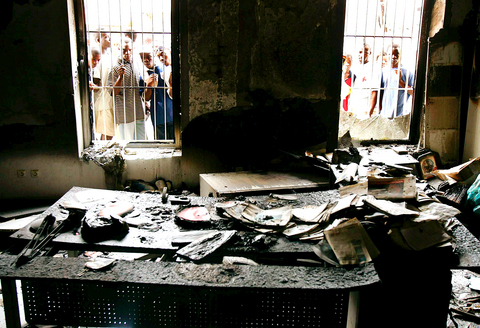Black-clad, masked assailants torched a German cultural center in crisis-hit Togo, while the man officially named winner of violently contested presidential elections vowed not to let the country slip into civil war.
Opposition coordinator Yawovi Agboyibo claimed Friday that 100 people were killed and more than 300 wounded by government loyalists and security forces in violence that erupted after Sunday's poll. The claim could not be independently verified and government officials could not be reached for comment.
The International Committee of the Red Cross has said at least 11 people were killed nationwide this week and at least 100 wounded. The government has confirmed another 11 dead.

PHOTO: EPA
Agboyibo said the toll was collected from opposition officials across the country. He said the government bused about 3,000 armed loyalists from the interior to Lome to help crack down on opposition supporters.
Faure Gnassingbe, official winner of Sunday's vote, denounced the attacks of recent days and assured the world that Togo was not on the fast track to civil war -- long the destructive route of its West African neighbors.
"I have confidence in the forces of order and security and, most of all, in the political maturity and good sense of the Togolese," Gnassingbe said in remarks published Friday.
"I do not think Togo will tip into civil war," he told French daily Le Monde. "Not, at least, as long as I am at the head of this country."
Opposition leaders in Togo insisted Gnassingbe's ruling party rigged the elections and preordained a victory for Gnassingbe, the son of Togo's late dictator who died Feb. 5.
Tuesday's announcement of Gnassingbe's win sparked two days of clashes.
Daytime violence subsided Thursday in the capital, Lome, but overnight assailants had attacked a German institute promoting cross-cultural exchange -- the latest post-election violence that targeted foreigners.
The attack on the Goethe Institute in the Togolese capital was well-executed, the center's Director Herwig Kempf said.
The gunmen, dressed all in black and wearing masks, forced their way inside the center's steel gates and beat two guards before sending them running away, Kempf said, citing the guards' accounts. The gunmen then opened fire on the white, art-deco building and set fire to the first-floor library. The fire engulfed most of the building.
Gunmen also torched a van parked in the courtyard, as well as a large toolshed. No one was injured in the attack, though damage was estimated at several hundred US dollars.
Through films, book-lending and language lessons, the Goethe Institute promotes cultural exchange between Togo and Germany, Togo's one-time colonial master.
Talk had been swirling of an attack on a German institution since Togo's former Interior Minister Francois Boko fled to the German Embassy on April 22, Kempf said. Boko had been dismissed after calling for the weekend elections to be canceled for fear of bloodshed.

DITCH TACTICS: Kenyan officers were on their way to rescue Haitian police stuck in a ditch suspected to have been deliberately dug by Haitian gang members A Kenyan policeman deployed in Haiti has gone missing after violent gangs attacked a group of officers on a rescue mission, a UN-backed multinational security mission said in a statement yesterday. The Kenyan officers on Tuesday were on their way to rescue Haitian police stuck in a ditch “suspected to have been deliberately dug by gangs,” the statement said, adding that “specialized teams have been deployed” to search for the missing officer. Local media outlets in Haiti reported that the officer had been killed and videos of a lifeless man clothed in Kenyan uniform were shared on social media. Gang violence has left

US Vice President J.D. Vance on Friday accused Denmark of not having done enough to protect Greenland, when he visited the strategically placed and resource-rich Danish territory coveted by US President Donald Trump. Vance made his comment during a trip to the Pituffik Space Base in northwestern Greenland, a visit viewed by Copenhagen and Nuuk as a provocation. “Our message to Denmark is very simple: You have not done a good job by the people of Greenland,” Vance told a news conference. “You have under-invested in the people of Greenland, and you have under-invested in the security architecture of this

Japan unveiled a plan on Thursday to evacuate around 120,000 residents and tourists from its southern islets near Taiwan within six days in the event of an “emergency”. The plan was put together as “the security situation surrounding our nation grows severe” and with an “emergency” in mind, the government’s crisis management office said. Exactly what that emergency might be was left unspecified in the plan but it envisages the evacuation of around 120,000 people in five Japanese islets close to Taiwan. China claims Taiwan as part of its territory and has stepped up military pressure in recent years, including

UNREST: The authorities in Turkey arrested 13 Turkish journalists in five days, deported a BBC correspondent and on Thursday arrested a reporter from Sweden Waving flags and chanting slogans, many hundreds of thousands of anti-government demonstrators on Saturday rallied in Istanbul, Turkey, in defence of democracy after the arrest of Istanbul Mayor Ekrem Imamoglu which sparked Turkey’s worst street unrest in more than a decade. Under a cloudless blue sky, vast crowds gathered in Maltepe on the Asian side of Turkey’s biggest city on the eve of the Eid al-Fitr celebration which started yesterday, marking the end of Ramadan. Ozgur Ozel, chairman of the main opposition Republican People’s Party (CHP), which organized the rally, said there were 2.2 million people in the crowd, but